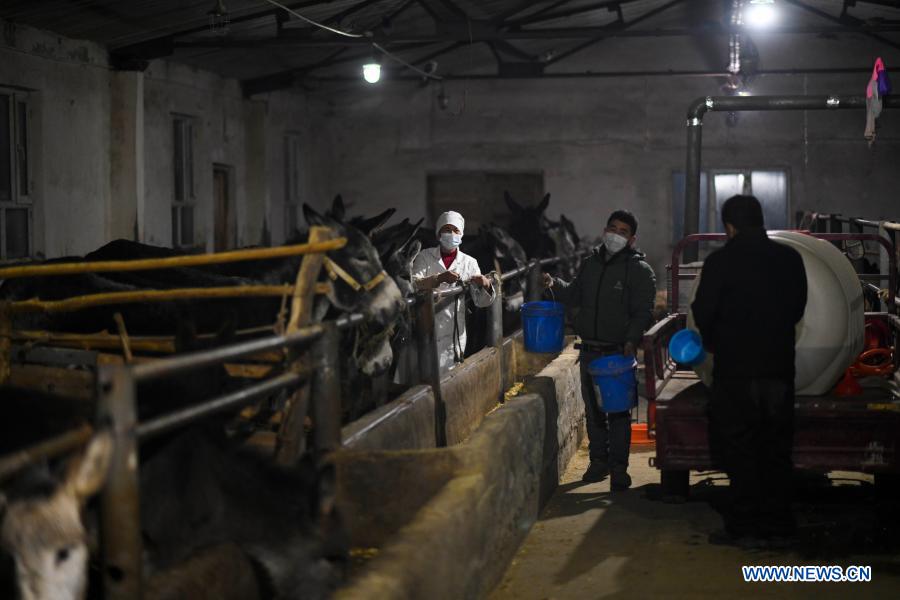
Ghulam Tuniyaz and his family operate in a stable at Jiayi Nagute Village, Koxtag Township, Pishan County, in Hotan of northwest China's Xinjiang Uygur Autonomous Region, Feb. 4, 2021. Five years ago, Ghulam Tuniyaz, now officer in charge of a breeding cooperative at Jiayi Nagute Village, happened to lay his hands on a donkey entrusted with him by his son Memet Ghulam. Memet got this hairy thing for free as part of poverty alleviation efforts of the local authority, but decided to turn his eyes to his father for help. Donkeys, commonly used for transportation, had been farmed in very careless manners in the village for a long time, which was obviously inadequate to "unleash" their value. Tuniyaz and his family attended a training program organized by the township authority, where they learned the proper way to feed donkeys, and it was also until then that he came to understand the fortune that was literally "hidden" in them. Soon after the training program, Tuniyaz, together with his son Memet and some of his impoverished neighbors, started a cooperative specialized in donkey breeding, and donkey milk thus became a leading source of its income. The family of Memet successfully shook off poverty by the end of 2019. With the help of a special poverty-alleviation funding from the County authority, Tuniyaz and six co-workers at the cooperative built a stable of 450 square meters, home to more than 30 donkeys, many of them owned by other villagers. Tuniyaz himself is now a highly recognized "locomotive" among the villagers on their track toward further prosperity. (Xinhua/Zhao Ge)
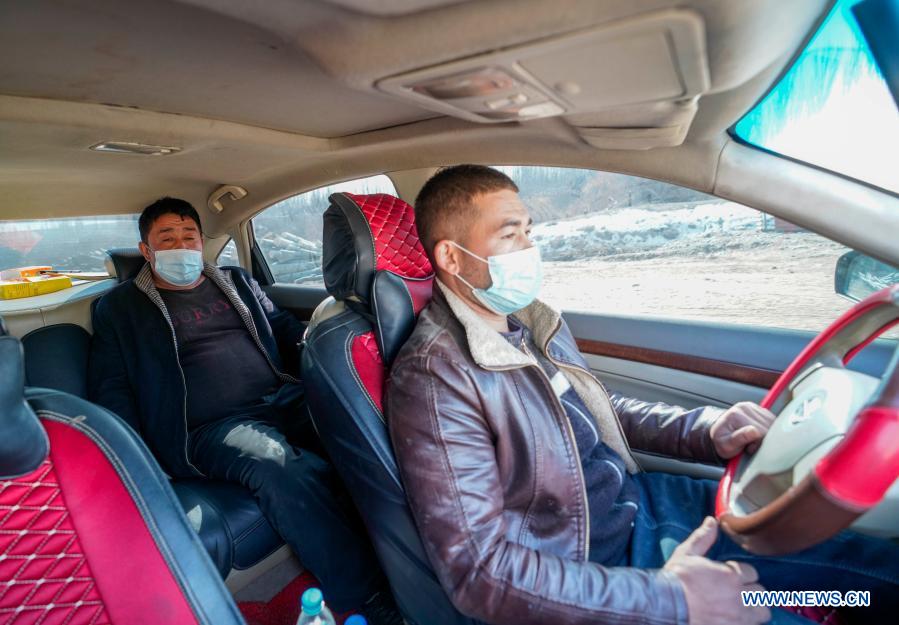
Memet Ghulam (R) takes his father Ghulam Tuniyaz in his newly bought car on a business trip at Jiayi Nagute Village, Koxtag Township, Pishan County, in Hotan of northwest China's Xinjiang Uygur Autonomous Region, Feb. 4, 2021. Five years ago, Ghulam Tuniyaz, now officer in charge of a breeding cooperative at Jiayi Nagute Village, happened to lay his hands on a donkey entrusted with him by his son Memet Ghulam. Memet got this hairy thing for free as part of poverty alleviation efforts of the local authority, but decided to turn his eyes to his father for help. Donkeys, commonly used for transportation, had been farmed in very careless manners in the village for a long time, which was obviously inadequate to "unleash" their value. Tuniyaz and his family attended a training program organized by the township authority, where they learned the proper way to feed donkeys, and it was also until then that he came to understand the fortune that was literally "hidden" in them. Soon after the training program, Tuniyaz, together with his son Memet and some of his impoverished neighbors, started a cooperative specialized in donkey breeding, and donkey milk thus became a leading source of its income. The family of Memet successfully shook off poverty by the end of 2019. With the help of a special poverty-alleviation funding from the County authority, Tuniyaz and six co-workers at the cooperative built a stable of 450 square meters, home to more than 30 donkeys, many of them owned by other villagers. Tuniyaz himself is now a highly recognized "locomotive" among the villagers on their track toward further prosperity. (Xinhua/Zhao Ge)

Memet Ghulam, son of Ghulam Tuniyaz, gets ready to milk a donkey at Jiayi Nagute Village, Koxtag Township, Pishan County, in Hotan of northwest China's Xinjiang Uygur Autonomous Region, Feb. 4, 2021. Five years ago, Ghulam Tuniyaz, now officer in charge of a breeding cooperative at Jiayi Nagute Village, happened to lay his hands on a donkey entrusted with him by his son Memet Ghulam. Memet got this hairy thing for free as part of poverty alleviation efforts of the local authority, but decided to turn his eyes to his father for help. Donkeys, commonly used for transportation, had been farmed in very careless manners in the village for a long time, which was obviously inadequate to "unleash" their value. Tuniyaz and his family attended a training program organized by the township authority, where they learned the proper way to feed donkeys, and it was also until then that he came to understand the fortune that was literally "hidden" in them. Soon after the training program, Tuniyaz, together with his son Memet and some of his impoverished neighbors, started a cooperative specialized in donkey breeding, and donkey milk thus became a leading source of its income. The family of Memet successfully shook off poverty by the end of 2019. With the help of a special poverty-alleviation funding from the County authority, Tuniyaz and six co-workers at the cooperative built a stable of 450 square meters, home to more than 30 donkeys, many of them owned by other villagers. Tuniyaz himself is now a highly recognized "locomotive" among the villagers on their track toward further prosperity. (Xinhua/Zhao Ge)
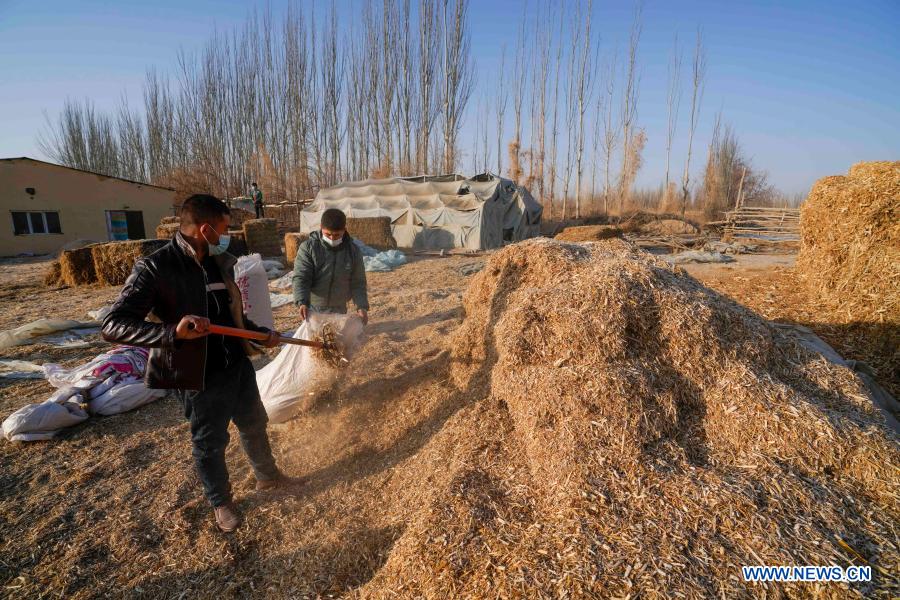
Ghulam Tuniyaz's two sons manage feedstuff at Jiayi Nagute Village, Koxtag Township, Pishan County, in Hotan of northwest China's Xinjiang Uygur Autonomous Region, Feb. 4, 2021. Five years ago, Ghulam Tuniyaz, now officer in charge of a breeding cooperative at Jiayi Nagute Village, happened to lay his hands on a donkey entrusted with him by his son Memet Ghulam. Memet got this hairy thing for free as part of poverty alleviation efforts of the local authority, but decided to turn his eyes to his father for help. Donkeys, commonly used for transportation, had been farmed in very careless manners in the village for a long time, which was obviously inadequate to "unleash" their value. Tuniyaz and his family attended a training program organized by the township authority, where they learned the proper way to feed donkeys, and it was also until then that he came to understand the fortune that was literally "hidden" in them. Soon after the training program, Tuniyaz, together with his son Memet and some of his impoverished neighbors, started a cooperative specialized in donkey breeding, and donkey milk thus became a leading source of its income. The family of Memet successfully shook off poverty by the end of 2019. With the help of a special poverty-alleviation funding from the County authority, Tuniyaz and six co-workers at the cooperative built a stable of 450 square meters, home to more than 30 donkeys, many of them owned by other villagers. Tuniyaz himself is now a highly recognized "locomotive" among the villagers on their track toward further prosperity. (Xinhua/Zhao Ge)
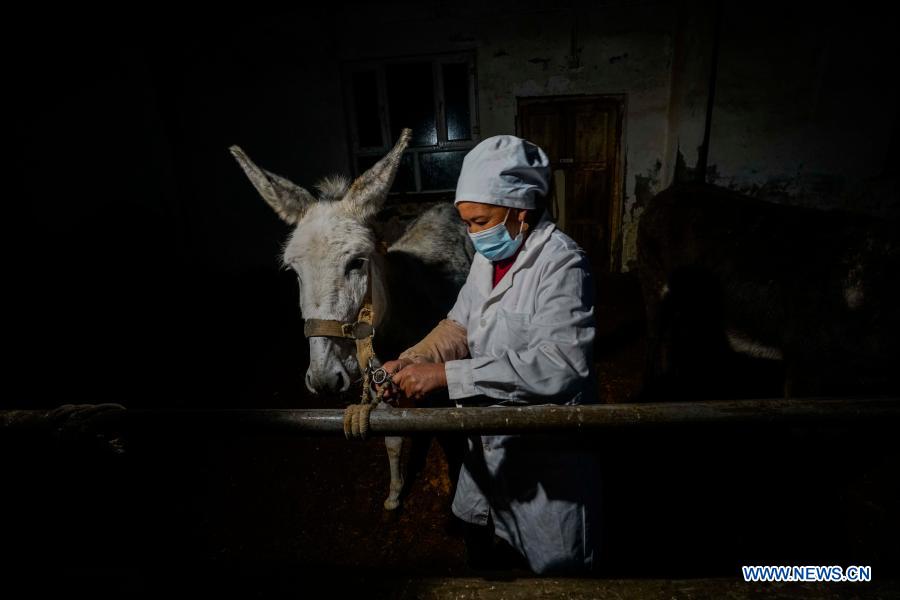
Wife of Ghulam Tuniyaz gets ready to milk a donkey at Jiayi Nagute Village, Koxtag Township, Pishan County, in Hotan of northwest China's Xinjiang Uygur Autonomous Region, Feb. 4, 2021. Five years ago, Ghulam Tuniyaz, now officer in charge of a breeding cooperative at Jiayi Nagute Village, happened to lay his hands on a donkey entrusted with him by his son Memet Ghulam. Memet got this hairy thing for free as part of poverty alleviation efforts of the local authority, but decided to turn his eyes to his father for help. Donkeys, commonly used for transportation, had been farmed in very careless manners in the village for a long time, which was obviously inadequate to "unleash" their value. Tuniyaz and his family attended a training program organized by the township authority, where they learned the proper way to feed donkeys, and it was also until then that he came to understand the fortune that was literally "hidden" in them. Soon after the training program, Tuniyaz, together with his son Memet and some of his impoverished neighbors, started a cooperative specialized in donkey breeding, and donkey milk thus became a leading source of its income. The family of Memet successfully shook off poverty by the end of 2019. With the help of a special poverty-alleviation funding from the County authority, Tuniyaz and six co-workers at the cooperative built a stable of 450 square meters, home to more than 30 donkeys, many of them owned by other villagers. Tuniyaz himself is now a highly recognized "locomotive" among the villagers on their track toward further prosperity. (Xinhua/Zhao Ge)
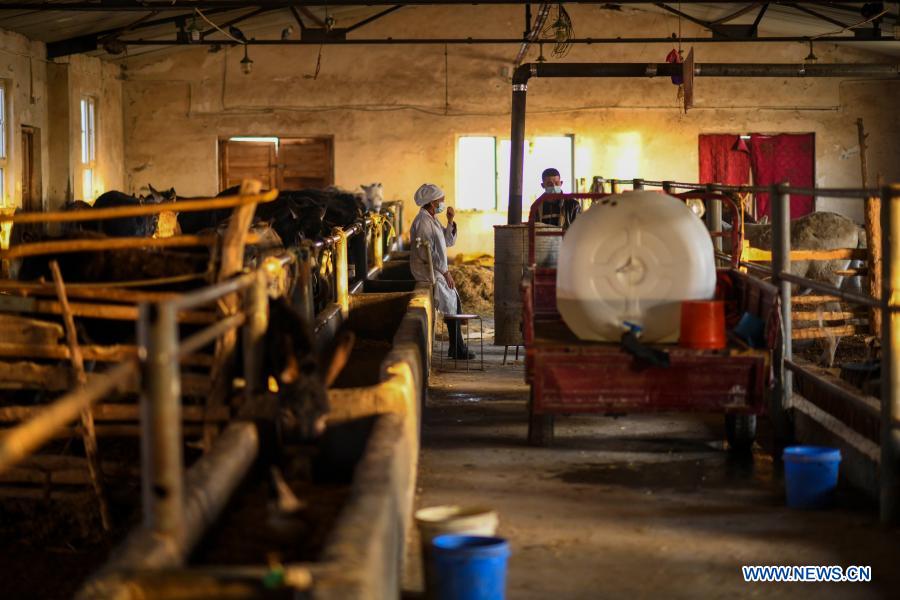
Ghulam Tuniyaz's wife and son chat in a stable at Jiayi Nagute Village, Koxtag Township, Pishan County, in Hotan of northwest China's Xinjiang Uygur Autonomous Region, Feb. 4, 2021. Five years ago, Ghulam Tuniyaz, now officer in charge of a breeding cooperative at Jiayi Nagute Village, happened to lay his hands on a donkey entrusted with him by his son Memet Ghulam. Memet got this hairy thing for free as part of poverty alleviation efforts of the local authority, but decided to turn his eyes to his father for help. Donkeys, commonly used for transportation, had been farmed in very careless manners in the village for a long time, which was obviously inadequate to "unleash" their value. Tuniyaz and his family attended a training program organized by the township authority, where they learned the proper way to feed donkeys, and it was also until then that he came to understand the fortune that was literally "hidden" in them. Soon after the training program, Tuniyaz, together with his son Memet and some of his impoverished neighbors, started a cooperative specialized in donkey breeding, and donkey milk thus became a leading source of its income. The family of Memet successfully shook off poverty by the end of 2019. With the help of a special poverty-alleviation funding from the County authority, Tuniyaz and six co-workers at the cooperative built a stable of 450 square meters, home to more than 30 donkeys, many of them owned by other villagers. Tuniyaz himself is now a highly recognized "locomotive" among the villagers on their track toward further prosperity. (Xinhua/Zhao Ge)
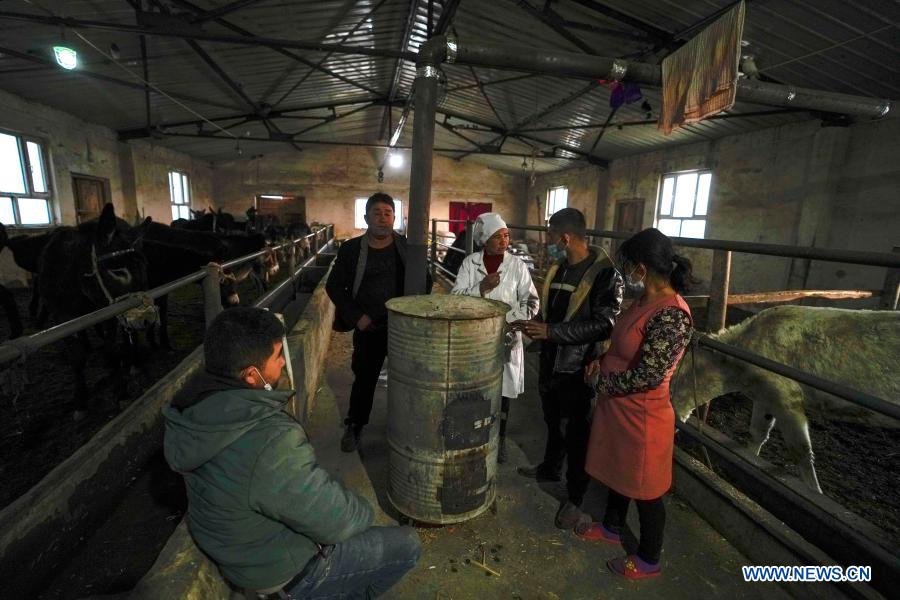
Ghulam Tuniyaz (2nd L) and his family discuss future plan for business development in a stable at Jiayi Nagute Village, Koxtag Township, Pishan County, in Hotan of northwest China's Xinjiang Uygur Autonomous Region, Feb. 4, 2021. Five years ago, Ghulam Tuniyaz, now officer in charge of a breeding cooperative at Jiayi Nagute Village, happened to lay his hands on a donkey entrusted with him by his son Memet Ghulam. Memet got this hairy thing for free as part of poverty alleviation efforts of the local authority, but decided to turn his eyes to his father for help. Donkeys, commonly used for transportation, had been farmed in very careless manners in the village for a long time, which was obviously inadequate to "unleash" their value. Tuniyaz and his family attended a training program organized by the township authority, where they learned the proper way to feed donkeys, and it was also until then that he came to understand the fortune that was literally "hidden" in them. Soon after the training program, Tuniyaz, together with his son Memet and some of his impoverished neighbors, started a cooperative specialized in donkey breeding, and donkey milk thus became a leading source of its income. The family of Memet successfully shook off poverty by the end of 2019. With the help of a special poverty-alleviation funding from the County authority, Tuniyaz and six co-workers at the cooperative built a stable of 450 square meters, home to more than 30 donkeys, many of them owned by other villagers. Tuniyaz himself is now a highly recognized "locomotive" among the villagers on their track toward further prosperity. (Xinhua/Zhao Ge)
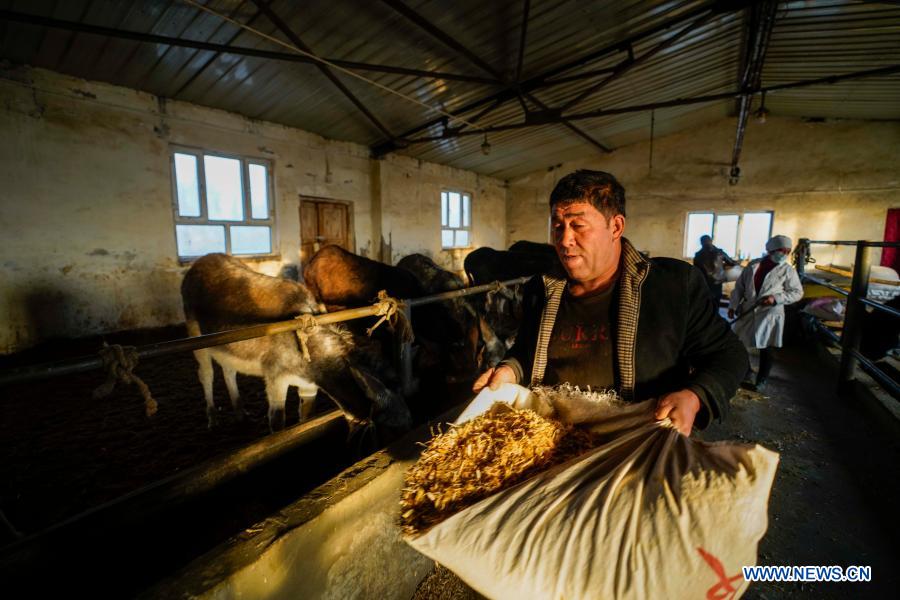
Ghulam Tuniyaz brings feedstuff to donkeys at Jiayi Nagute Village, Koxtag Township, Pishan County, in Hotan of northwest China's Xinjiang Uygur Autonomous Region, Feb. 4, 2021. Five years ago, Ghulam Tuniyaz, now officer in charge of a breeding cooperative at Jiayi Nagute Village, happened to lay his hands on a donkey entrusted with him by his son Memet Ghulam. Memet got this hairy thing for free as part of poverty alleviation efforts of the local authority, but decided to turn his eyes to his father for help. Donkeys, commonly used for transportation, had been farmed in very careless manners in the village for a long time, which was obviously inadequate to "unleash" their value. Tuniyaz and his family attended a training program organized by the township authority, where they learned the proper way to feed donkeys, and it was also until then that he came to understand the fortune that was literally "hidden" in them. Soon after the training program, Tuniyaz, together with his son Memet and some of his impoverished neighbors, started a cooperative specialized in donkey breeding, and donkey milk thus became a leading source of its income. The family of Memet successfully shook off poverty by the end of 2019. With the help of a special poverty-alleviation funding from the County authority, Tuniyaz and six co-workers at the cooperative built a stable of 450 square meters, home to more than 30 donkeys, many of them owned by other villagers. Tuniyaz himself is now a highly recognized "locomotive" among the villagers on their track toward further prosperity. (Xinhua/Zhao Ge)

Ghulam Tuniyaz (2nd L) and his family show just-collected donkey milk at Jiayi Nagute Village, Koxtag Township, Pishan County, in Hotan of northwest China's Xinjiang Uygur Autonomous Region, Feb. 4, 2021. Five years ago, Ghulam Tuniyaz, now officer in charge of a breeding cooperative at Jiayi Nagute Village, happened to lay his hands on a donkey entrusted with him by his son Memet Ghulam. Memet got this hairy thing for free as part of poverty alleviation efforts of the local authority, but decided to turn his eyes to his father for help. Donkeys, commonly used for transportation, had been farmed in very careless manners in the village for a long time, which was obviously inadequate to "unleash" their value. Tuniyaz and his family attended a training program organized by the township authority, where they learned the proper way to feed donkeys, and it was also until then that he came to understand the fortune that was literally "hidden" in them. Soon after the training program, Tuniyaz, together with his son Memet and some of his impoverished neighbors, started a cooperative specialized in donkey breeding, and donkey milk thus became a leading source of its income. The family of Memet successfully shook off poverty by the end of 2019. With the help of a special poverty-alleviation funding from the County authority, Tuniyaz and six co-workers at the cooperative built a stable of 450 square meters, home to more than 30 donkeys, many of them owned by other villagers. Tuniyaz himself is now a highly recognized "locomotive" among the villagers on their track toward further prosperity. (Xinhua/Zhao Ge)








